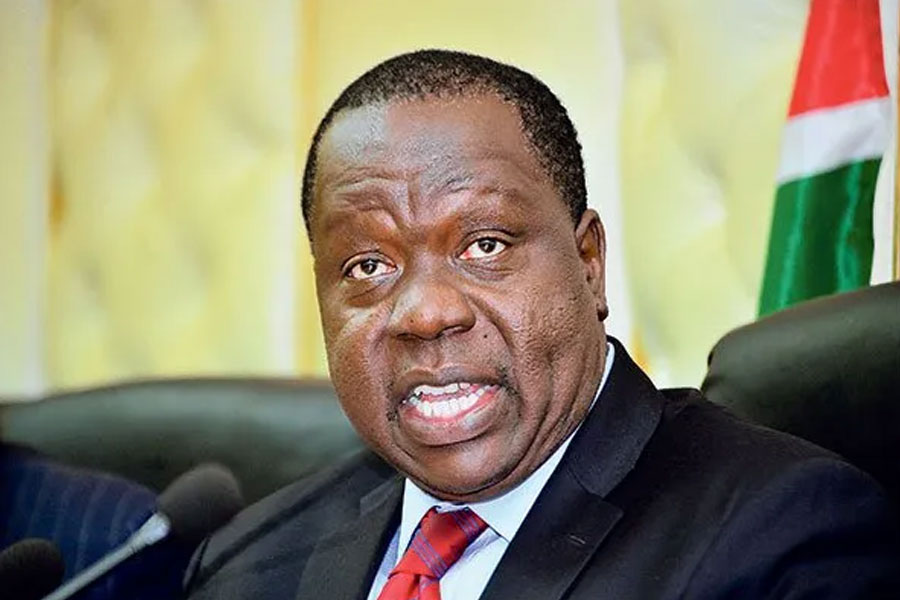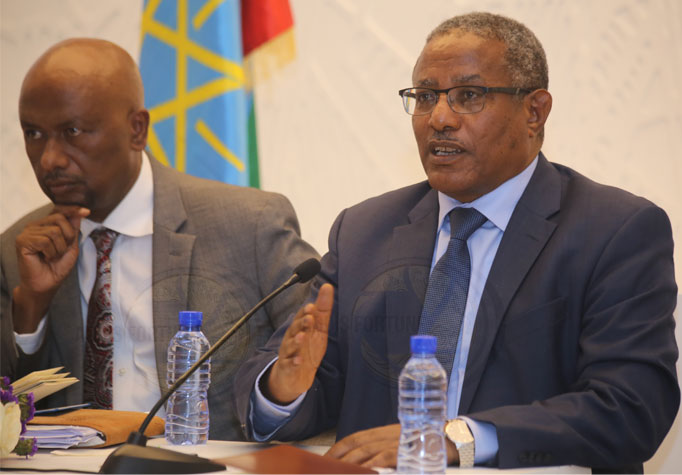
Radar | Nov 05,2022
Aklilu Wolde was born and raised in Addis Abeba. A seventh child for his parents, he grew up around Taiwan Market in Merkato, officially known as Addis Ketema District.
He had to leave the city in 2008 after a college placement landed him in Dire Dawa. It left him longing for his city despite occasional visits during school breaks. He returned to the capital after graduating in construction technology and management, full of hope and excitement.
“What I love about the city is the older architecture of some of the key sights, such as National Theatre,” he says.
Others residents, too, seem to appreciate the heritage and culture of the city.
“The people of Addis are very accommodating and nobody cares or even asks where you are from,” says Seleshi Umer, a motivational speaker who moved to the city from Debrezeit seven years ago. “The social life and lifestyle are what attracted me.”
Out of a survey of 50 residents of the city, sentiments and aspirations about Addis Abeba went along the same vein. Asked about what they wanted to see in their city, and what they expected of their mayor, most were pragmatic. They hoped to see a city that would support them in their endeavours to learn, work, enjoy and raise their children.
The residents were interviewed at various locations in the city: Qera, Piassa, Bole, Mesqel Flower, National Stadium and Haya Hulet. They hoped and aspired to see a city where the transportation is functional, the infrastructure working, the streets are clean and kept, rents are affordable, employment opportunities are ample, the cultural heritage is preserved and an urban setting that supports a thriving art scene and human diversity.
Addis Abeba, a century or more since its birth, is home to nearly four percent of the nation's population. It is the continental hub for Africa, as much as it is the political and economic epicentre of Ethiopia. The city is host to one of the largest number of United Nation’s missions in the world, as well as being the seat of the African Union’s headquarters.
“This is a city that has been continuously giving and getting nothing in return,” says Henok Birqu, 29, a sound engineer. “It deserves more.”
His hopes for the city are the improvement of the quality of life. His idea of progress is the 50-billion-Br La Gare Eagle Hills complex, a project concept that is still in its inception and features hotels, apartments, shops and entertainment centres.
Jointly owned by Abu Dhabi-based private real estate company, Eagle Hills, and the City Administration, it is expected to have three hotels, 4,000 apartments, a mall and entertainment centres developed on a 36ha plot of land. The project is expected to provide employment opportunities to 25,000 people.
Another recent major project in the city is the 29-billion-Br River Revitalisation Project that hopes to clean the riverbeds and riverbanks across Addis Abeba. The cost of a pilot project alone is expected to be 2.5 billion Birr, equivalent to around six percent of the city administration’s budget and almost seven percent of the tax revenue it plans to collect.
The city also has a plan to provide street vendors with free space.
The plan incorporates the installations of water treatment plants, tunnel development and stormwater facilities. It will also include roads, playgrounds, sports fields, shops, bicycle paths, walkways and entertainment sections - all of it planned, from concept development to implementation, to be completed in three years.
Just this month, the City Administration announced the construction of another project for a library that will lie on 38,687Sqm of land, Adwa Centre, that will include a museum, a cinema, a conference hall, a children’s zone, a sports centre, art exhibition centres, cafés and a green area.
But such fancy projects are not uppermost on the minds of city residents, who wish for mundane things such as a functional city that is well managed and maintained. They are concerned with the constant power interruptions, water shortages, housing costs, uncollected garbage on their streets, failed infrastructure and the poor services delivered by the municipal departments.
“I want a city that can properly provide me with basic services,” says Wasihun Fantahun, 32, a businessperson.
Only 25 weredasout of the 116 in the city receive uninterrupted running water throughout the whole week. The rest get rationed water that arrives at the taps between one and five days a week. The Addis Abeba Water & Sewerage Authority is able to supply 575,000 cubic metres of water, satisfying just two-thirds of overall demand.
There are a number of projects the city is undertaking to tackle this problem. The most recent is the Legedadi Phase II Water Project to supply potable water to 860,000 residents of the city and others in the outskirts at a cost of 2.4 billion Br.
However, the project was greeted with opposition by the Oromia Regional State government, which stated that the plan required more consultation.
This is an issue that has quickly become politicised. It was one more reminder that national politics will continue to impact how the city is administered. In fact, Addis Abeba has figured highly in the current polarised atmosphere.
Recently, tensions rose after the city administration identified over 51,000 beneficiaries of housing units under its middle and lower-middle income housing scheme. Some of the units were built in Koye Feche and Yeka Abado sites, both in the outskirts of the city, sparking debate about administrative demarcations and compensation made to farmers.
Voices have grown louder over how and who should administer the city as well. This has involved debates over Deputy Mayor Takele Uma, an unelected official who was appointed by the City Council as the de facto mayor.
For some residents, the city’s mayor should be a native of the city.
“Addis Abeba needs a leader that understands the cultural and historical heritage of the city,” says Sisay Sahlu, 27, a journalist.
Fortune surveyed 50 residents of the city about their sentiments and aspirations about Addis Abeba, as well as what they expected from their mayor.
Nazerth Hailemariam, a supervisor at Mesqel Flower Hotel, disagrees.
“The recent changes in the city are indications that the residents should support their leader and be patient with him,” she says.
Other residents consider the whole debate about this issue to be a pointless exercise when the most important task of a mayor should be the ability to address infrastructure problems.
“Whoever the mayor is, the basic demands should be addressed,” says Nuredin Shefi, 58, a war veteran.
A recurring and daily problem for the residents is dealing with transportation congestion, struggling with a rising cost of living and unemployment. The last matter has been especially tasking, with residents demanding effective job creation schemes.
The Job Creation & Food Security Agency recently allocated two billion Birr to be used for job creation in the city. The city also has a plan to provide street vendors with free space.
The city recently tried its hand at extending the same scheme for unemployed youth in the city. After multiple vendor stalls were constructed at the most unlikely places, such as islands in the middle of busy streets, the plan was abandoned and the vendor sheds were demolished - much to the relief of residents who complained about the unsightly scenes and the ridiculousness of the scheme.
Adding to the woes of the city are the rampant homeless street children who roam the city streets by night and day. The city’s plan for this was to embark upon a project of rehabilitating thousands of the destitute and the homeless street children after allocating 100 million Br as seed money. After recruiting hundreds of volunteers and housing many homeless people in empty government-owned buildings, the project is still limping along without any direction or long-term plan.
Another consistent problem, despite various efforts, is the transportation issue. There are currently around 585,000 vehicles in Addis Abeba, 60pc of the total vehicles in the country.
Addis Abeba has 366 Anbessa city buses, 188 public service buses, 240 Sheger public buses, 86 Sheger student buses and 64 Alliance City Buses. A few months ago, the Addis Abeba Transport Authority floated a tender for the procurement of 500 buses.
Under the Transport & Traffic Management System project funded by 192.9 million dollars from the World Bank, the city’s Roads Authority has been working on improving the city’s transport and traffic congestion problems.
The project involves expanding the existing traffic signal and control systems in Addis Abeba, improving the conditions of selected streets for pedestrians, modernising the operations of Anbessa City Bus Enterprise and strengthening the urban transport agencies.
Recently, a 3.8Km road project that extends from Pushkin Square to Gotera Interchange and will cost the city 1.5 billion Br, was launched. The 30m to 45m wide road will also include a tunnel and the nation's first Bus Rapid Transit system.
Population growth, fuelled by urbanisation, is no less a concern for residents.
“Almost every mechanic at my car repair shop is from somewhere outside of Addis,” says Abule Seyoum, 47, pointing to a garage he manages on Gabon Street.
The hopeful see it the other way around. They believe they are the backbone of the city and that the administration could do a better job of accommodating them.
“I came to the city eight years ago, but I am still not able to get an identification card from the city officials," says Mesfin Motela, a street vendor.
His frustration with the city is not only limited to residents but also with business regulations that find bureaucratic hurdles tasking.
Few believe that the problems of such a complicated and diverse city could be fixed by a magic wand. But there are steps the city administration can take to close some of the gaps, they say.
“The residents of the city are rarely consulted when decisions are made,” says Sisay, the journalist. “They have always been on the receiving end of things, which should change.”
Basic service problems of electricity and water are the result of management and administrative failures, rather than a mere shortage, according to Berhanu Zeleke (PhD), a lecturer at Kotebe Metropolitan University and an expert in urban development studies for the past two decades.
“The way to transform the city is through ambitious projects that the government is currently engaging in,” he says. “The City Administration and its residents need to be patient with the changes they want.”
PUBLISHED ON
Apr 26,2019 [ VOL
20 , NO
991]

Sunday with Eden | Feb 06,2021

Verbatim | Aug 13,2022

Fortune News | Mar 03,2020

Fortune News | Sep 11,2020

Radar | Nov 02,2019

Feb 24 , 2024 . By MUNIR SHEMSU
Abel Yeshitila, a real estate developer with a 12-year track record, finds himself unable to sell homes in his latest venture. Despite slash...

Feb 10 , 2024 . By MUNIR SHEMSU
In his last week's address to Parliament, Prime Minister Abiy Ahmed (PhD) painted a picture of an economy...

Jan 7 , 2024
In the realm of international finance and diplomacy, few cities hold the distinction that Addis Abeba doe...

Sep 30 , 2023 . By AKSAH ITALO
On a chilly morning outside Ke'Geberew Market, Yeshi Chane, a 35-year-old mother cradling her seven-month-old baby, stands amidst the throng...

Apr 20 , 2024
In a departure from its traditionally opaque practices, the National Bank of Ethiopia...

Apr 13 , 2024
In the hushed corridors of the legislative house on Lorenzo Te'azaz Road (Arat Kilo)...

Apr 6 , 2024
In a rather unsettling turn of events, the state-owned Commercial Bank of Ethiopia (C...

Mar 30 , 2024
Ethiopian authorities find themselves at a crossroads in the shadow of a global econo...